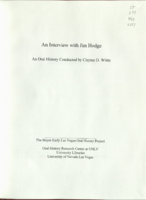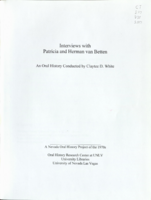Search the Special Collections and Archives Portal
Search Results
Lovell Gaines oral history interview
Identifier
Abstract
Oral history interview with Lovell Gaines conducted by Claytee D. White on July 01, 2009 for the African Americans in Las Vegas: a Collaborative Oral History Project. In this interview Lovell Gaines discusses his involvement with the National Association for the Advancement of Colored People (NAACP), becoming president for the Las Vegas, Nevada chapter in 1980, segregation, Freedom Fund banquets, national conventions, police brutality, and housing issues in Las Vegas.
Archival Collection
Audio recording clip from the first interview with Senator Joe Neal by Claytee D. White, January 24, 2006
Date
Archival Collection
Description
Part of an interview with Senator Joe Neal by Claytee White on January 24, 2006. Neal discusses his fight for single-seat districts in the Nevada Legislature.
Sound
Audio recording clip from the second interview with Senator Joe Neal by Claytee D. White, February 7, 2006
Date
Archival Collection
Description
Part of an interview with Senator Joe Neal by Claytee White on February 7, 2006. Neal discusses his early work in the Nevada Legislature, including his support for restoring rights to felons and his opposition to capital punishment.
Sound

Transcript of interview with Alice Cowles Brown by Eric M. Cheese, March 31, 1981
Date
Archival Collection
Description
Text
Dell Ray Rhodes oral history interview
Identifier
Abstract
Oral history interview with Dell Ray Rhodes conducted by Claytee D. White on April 01, 2010 for the African Americans in Las Vegas: a Collaborative Oral History Project. Rhodes discusses working at various jobs, including being one of the first African-Americans to work in the University of Nevada Las Vegas Registrar's office and at the U.S. Post Office. She also discusses the civil rights movement and school integration in Las Vegas, Nevada in the early 1970s.
Archival Collection

Transcript of interview with Jim Hodge by Claytee White, April 13, 2009
Date
Archival Collection
Description
Jim Hodge describes an active and success filled life in this narrative. Born and raised in the South, Jim enlisted in the Navy at the young age of 17, just as World War II was winding down. His primary job was that of a cook. He became smitten with the life of an entertainer after participating in a play and headed for Hollywood in 1952. It was there that he auditioned for Donn Arden, who organized and directed Las Vegas shows. Though he didn't get the part, he did get hired to be a singer for a show featuring Betty Grable. Thus his career was launched and would span the heyday of Las Vegas entertainment from the 1950s to the 1970s. Jim talks about the people, shows and places that touched his life. He also offers thoughts about the changes in the Vegas entertainment scene as well as shares his relationship with his church over the past 40 years.
Text

Transcript of interview with Pat van Betten by Claytee White, February 6, 2007
Date
Archival Collection
Description
Patricia and Herman van Betten met in Pittsburg through their volunteer work on the John F. Kennedy Campaign. After their Connecticut wedding and Herman's studies at the University of Texas and the University of Southern California, they and three small children moved to Las Vegas. Their fourth child, a native Las Vegan, was born in 1968. In 1967, Herman acquired a position at the Nevada Southern University, which is now the University of Nevada, Las Vegas. Beginning in the 1970's the couple worked diligently to make the Las Vegas community a great place to live. They participated in The League of Women Voters, The Consumer League, the Welfare Rights Movement, and the Community of a Hundred. Patricia served as the President of the Consumer League and Herman was elected to the local school board. They were jointly appointed by the ACLU as Civil Librarians of the Year, 1990-1991. Currently retired, they engage in civic, environmental, and historical activism in the village of
Text
Hattie Canty oral history interview
Identifier
Abstract
Oral history interview with Hattie Canty conducted by Claytee White on February 27 and June 17, 1998 for the Las Vegas Women Oral History Project. In this interview, Hattie Canty recalls moving to Las Vegas, Nevada in the late 1960s and working as a maid for the Thunderbird Hotel and Casino and later the Maxim Hotel and Casino. Canty discusses her tenure as the Culinary Union Local 226 President during which she faced several labor challenges and went to jail at least six times while striking. Hattie also recalls how she influenced contract negotiations for the downtown hotels, improved race relations among workers, involved more members in union operations, and implemented the Culinary Training School.
Archival Collection

Transcript of interview with Ronald Bananto by Eric Henninger, March 15, 1981
Date
Archival Collection
Description
Text
Audio recording clip of interview with Monroe Williams by Claytee D. White, August 15, 2000
Date
Archival Collection
Description
Part of an interview with Monroe Williams conducted by Claytee D. White on August 15, 2000. Williams describes his experience in the fire department.
Sound
